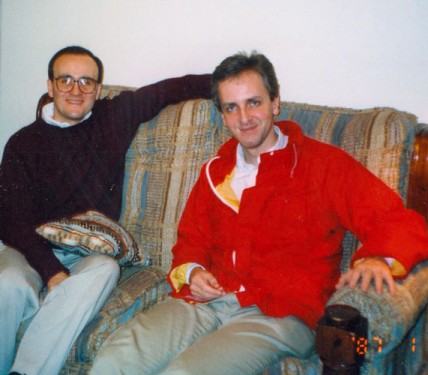
By Father Robert M. Powers
I met James Massa when he arrived at St. Teresa’s in Woodside in August, 1985. At the time I was a fifth-grade teacher at St. David’s School in Manhattan and had an apartment in Sunnyside. I had recently joined the parish through the warm invitation of Father D. Joseph Finnerty, who had recently been appointed pastor.
James had just graduated after three years at Yale University’s Divinity School with a master of divinity degree. He was not the typical applicant to the seminary with his degree, and diocesan officials wondered what to do with him.
Yale Divinity had a significant Catholic presence on its faculty, and James had completed ample coursework in the Catholic tradition. He was assigned to a pastoral year internship at St. Teresa’s, with the agreement that he would spend a second year auditing courses and participating in formation sessions at the Seminary of the Immaculate Conception in Huntington, L.I.
That year of resident seminary formation never happened. The pastor, the diocese and the seminary administration saw that this candidate was not just theologically competent, but also pastorally talented. James was incredibly well formed as a man on the road to priesthood, and the formation of this disciple of Jesus Christ had occurred through his incredible self-discipline in prayer life and in all areas of his life. He had undertaken his own seminary formation for many years before his ordination.
When James began his career in seminary work at Pope John XXIII Seminary for second career vocations, I kidded him that the appointment was a bit ironic in that nearly all of his students were older than he was. Yet his work over the years at that seminary, at Huntington and at Dunwoodie has been incredibly life-giving for so many seminarians and priests. I would like to think he practiced his formation skills on me, that in a sense I was his first seminarian.
Kindness, Compassion
What I experienced in our friendship, as did so many others in our diocese, was his kindness and compassion. I had not prepared financially for the seminary, and the limited funds I had in those years came largely from my parents. James shared many a cheap meal with me, as that was all that I could afford. He rejoiced with me when ordination in 1992 brought me into relative prosperity, and both of us into better cuisine and a more comfortable standard of travel.
But if James is gentle and easy on others, he is also challenging. He demands that bottom lines have to be acknowledged, even as he empathizes, and not infrequently agonizes, with those who experience pain in having to face difficult realities. All his friends and I are better people for the time we have spent with him.
What is perhaps most endearing about this brilliant man is his self-deprecating humor, the humor that he most appreciates in others.
I am sorry that Irene and Andy, his wonderful parents, did not live to see his episcopal ordination. Irene died suddenly of a heart attack in 1997. Andy had a stroke a few months later and suffered permanent paralysis. James and his sister and brother lovingly oversaw his care at Andy’s home in Clark, N.J., until Andy’s death in 2002.
I am glad to have known them because they really exemplified how good parents can teach their children by word and example how to follow Christ’s mandates to love God and neighbor. They were effective teachers who had a profound effect upon their pupils – Kathy, Jack, Bobby (who died at 36 in 1994) and James.
There is someone else I will miss on July 20 – a mutual friend of ours: Father Benedict Groeschel, C.F.R., who died last year. James audited his course in pastoral counseling at Huntington one afternoon a week during that pastoral year at St. Teresa’s.
Father Groeschel had grown up in Jersey City, where James was born and where his mother had grown up. James certainly liked him as a local, familiar character, but also admired his message as I did.
Father Groeschel challenged the Church to face a need for “the reform of the reform” – a rethinking of many of the changes in the Church that had occurred after the Second Vatican Council, and that claimed to be, but were not true to the spirit of the council.
Unlike James, Father Groeschel was gruff and unnuanced, but I believe his words were prophetic for James. When speaking of changes in religious life that had disastrous effects upon once vibrant orders and congregations, Father Groeschel would often jokingly comment with the 1960s advertising slogan, “When you’re out of Schlitz, you’re out of beer.”
I have great hope that my friend, our new auxiliary bishop, James Massa, will restock our shelves with much that has been lost. Under the guidance of the Holy Spirit, he will certainly plant seeds of revival of the Church in our diocese and elsewhere. If God wills it, we may even see revival in our time. I am happy to see elevated to the episcopate such a kind and compassionate heart and such a comprehensive mind. A shepherd’s staff belongs in his gentle hands; he will keep many within the fold and will inspire many to return.
Father Powers is the pastor of St. Patrick’s Church, Long Island City.
